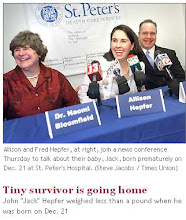Saturday, September 12, 2009
Uncontrolled growth of the US health care sector is a good thing?
1993 Nobel Prize Winner in Economics, Robert Fogel, writing in the Journal of the American Enterprise Institute says it is not necessary to control US health care costs. According to Fogel:
"There is no need to suppress the demand for healthcare. Expenditures on healthcare are driven by demand, which is spurred by income and by advances in biotechnology that make health interventions increasingly effective."
Fogel goes on to say that increasing US health care costs are a part of a very long-term trend and are not necessarily a bad thing:
"The main factor is that the long-term income elasticity of the demand for healthcare is 1.6—for every 1 percent increase in a family’s income, the family wants to increase its expenditures on healthcare by 1.6 percent. This is not a new trend. Between 1875 and 1995, the share of family income spent on food, clothing, and shelter declined from 87 percent to just 30 percent, despite the fact that we eat more food, own more clothes, and have better and larger homes today than we had in 1875. All of this has been made possible by the growth in the productivity of traditional commodities. In the last quarter of the 19th century, it took 1,700 hours of labor to purchase the annual food supply for a family. Today it requires just 260 hours, and it is likely that by 2040, a family’s food supply will be purchased with about 160 hours of labor."
"There is no need to suppress the demand for healthcare. Expenditures on healthcare are driven by demand, which is spurred by income and by advances in biotechnology that make health interventions increasingly effective."
Fogel goes on to say that increasing US health care costs are a part of a very long-term trend and are not necessarily a bad thing:
"The main factor is that the long-term income elasticity of the demand for healthcare is 1.6—for every 1 percent increase in a family’s income, the family wants to increase its expenditures on healthcare by 1.6 percent. This is not a new trend. Between 1875 and 1995, the share of family income spent on food, clothing, and shelter declined from 87 percent to just 30 percent, despite the fact that we eat more food, own more clothes, and have better and larger homes today than we had in 1875. All of this has been made possible by the growth in the productivity of traditional commodities. In the last quarter of the 19th century, it took 1,700 hours of labor to purchase the annual food supply for a family. Today it requires just 260 hours, and it is likely that by 2040, a family’s food supply will be purchased with about 160 hours of labor."
Subscribe to:
Post Comments (Atom)

No comments:
Post a Comment